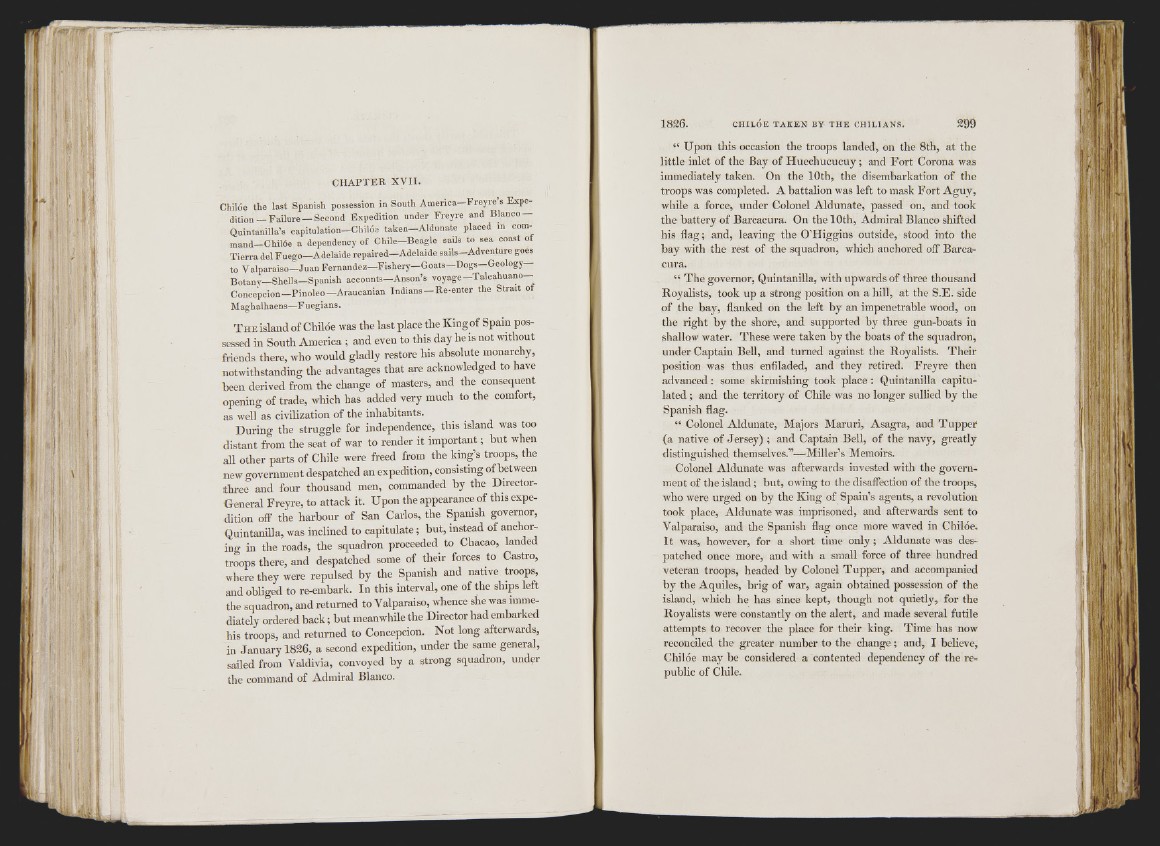
C H A P T E R X V I I .
Chilúe the la st Spanish possession in South America—Frey re s Exped
itio n— F a ilu r e— Second Expedition under Frey re and Blanco —
Quintanilla’s c ap itu latio n -C h ilo e ta k e n -A ld u n a te placed in command—
Chilóe a dependency of Chile—Beagle sails to sea coast of
T ie rra del Fuego—Adelaide repaired—Adelaide sails—Adventure goes
to V a lp a r a iso -J u a n F e r n a n d e z — F is h e ry -G o a ts -H o g s -G e o lo g y—
Botany—Shells—Spanish accounts—Anson’s voyage—Taleahuano
Concepcion—Pin o leo—Araucanian Indians — Re-enter the Strait of
IMaghalhaens—F uegians.
T h e island of Chiloe was the last place the King of Spain possessed
in South America ; and even to this day he is not without
friends there, who would gladly restore his absolute monarchy,
notwithstanding the advantages that are acknowledged to have
heen derived from the change of masters, and the consequent
opening of trade, wliich has added very much to the comfort,
as well as civilization of the inhabitants.
During the struggle for independence, this island was too
distant from the seat of war to render it important; hut when
all other parts of Chile were freed from the king’s troops, the
new government despatched an expedition, consisting of between
three and four thousand men, commanded hy the Director-
General Freyre, to attack it. Upon the appearance of this expedition
off the harbour of San Carlos, the Spanish governor,
Quintanilla, was inclined to capitulate; but, instead of
ing in the roads, the squadron proceeded to Chacao, landed
troops there, and despatched some of their forces to Castro,
where they were repulsed by the Spanish and native troops,
and obliged to re-embark. In this interval, one of the ships left
the squadron, and returned to Valparaiso, whence she was immediately
ordered back; but meanwhile the Director had embarked
his troops, and returned to Concepcion. Not long afterwards,
in January 1826, a second expedition, under the same general,
sailed from Valdivia, convoyed by a strong squadron, under
the command of Admiral Blanco.
“ Upon this occasion the troops landed, on the 8th, at the
little inlet of the Bay of Huechucucuy; and Fort Corona was
immediately taken. On the 10th, the disembarkation of the
troops was completed. A battalion was left to mask Fort Aguy,
while a force, under Colonel Aldunate, passed on, and took
the battery of Barcacura. On the 10th, Admiral Blanco shifted
his flag; and, leaving the O’Higgins outside, stood into the
bay with the rest of the squadron, which anchored off Barcacura.
“ The governor, Quintanilla, with upwards of three thousand
Royalists, took up a strong position on a hill, at the S.F. side
of the bay, flanked on the left by an impenetrable wood, on
the right by the shore, and supported by three gun-boats in
shallow water. These were taken by the boats of the squadron,
under Captain Bell, and turned against the Royalists. Their
position was thus enfiladed, and they retired. Freyre then
advanced: some skirmishing took place ; Quintanilla capitulated
; and the territory of Chile was no longer sullied hy the
Spanish flag.
“ Colonel Aldunate, Majors Maruri, Asagra, and Tiipper
(a native of Jersey) ; and Captain Bell, of the navy, greatly
distinguished themselves.’’—Miller’s Memoirs.
Colonel Aldunate was afterwards invested with the government
of the island ; but, owing to the disaffection of the troops,
who were urged on by the King of Spain’s agents, a revolution
took place, Aldunate was imprisoned, and afterwards sent to
Valparaiso, and the Spanish flag once more waved in Chilóe,
It was, however, for a short time only ; Aldunate was despatched
once more, and with a small force of three hundred
veteran troops, headed by Colonel Tupper, and accompanied
by the Aquiles, brig of war, again obtained possession of the
island, which he has since kept, though not quietly, for the
Royalists were constantly on the alert, and made several futile
attempts to recover the place for their king. Time has now
reconciled the greater number to the change; and, I believe,
Chilóe may be considered a contented dependency of the republic
of Chile.
Í
li